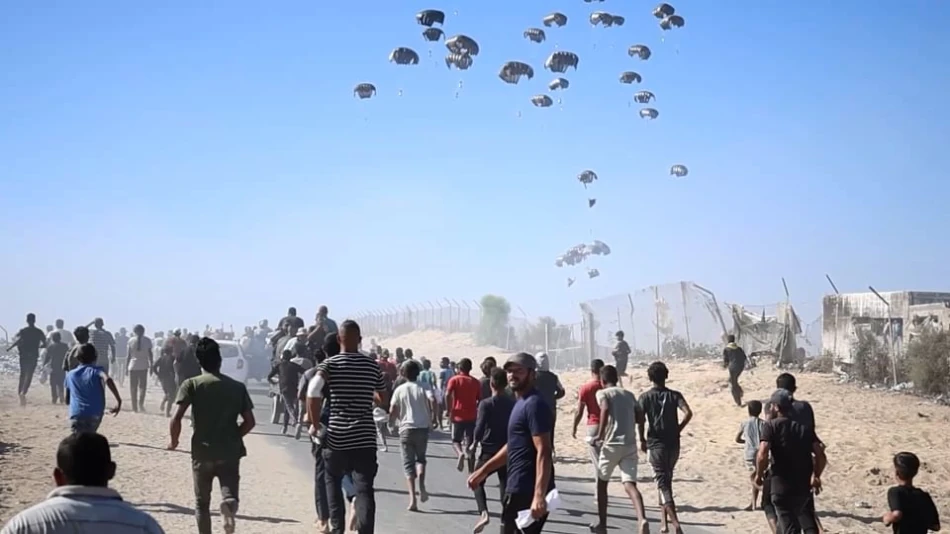
UAE Airdrops Aid for Second Consecutive Day Over Gaza in 'Operation Goodwill Birds'
UAE Completes 55th Humanitarian Airdrop to Gaza as Regional Powers Fill Critical Aid Gaps
The United Arab Emirates, working alongside Jordan, has conducted its 55th consecutive humanitarian airdrop into Gaza's isolated areas, delivering essential supplies under the "Birds of Goodness" operation. This sustained effort highlights how regional powers are stepping up to address humanitarian crises when traditional aid channels face obstacles, potentially reshaping Middle Eastern diplomatic dynamics and humanitarian response strategies.
Operation Scale Reveals Strategic Commitment
The UAE's "Noble Knight 3" operation has now delivered approximately 3,750 tons of food and emergency supplies since its inception. This substantial volume—equivalent to roughly 150 fully loaded cargo trucks—demonstrates a level of logistical commitment that goes beyond symbolic gestures. The operation targets areas inaccessible by land due to security conditions, filling critical gaps in Gaza's humanitarian supply chain.
The consistency of daily operations, now spanning nearly two months, suggests the UAE has established a dedicated air corridor and supply chain infrastructure specifically for this mission. This operational capacity indicates significant resource allocation and strategic planning at the highest government levels.
Regional Diplomacy Through Humanitarian Action
UAE's Evolving Middle East Strategy
This humanitarian initiative reflects the UAE's broader strategy of positioning itself as a regional stabilizing force. Unlike traditional Gulf state approaches that often relied on financial contributions channeled through international organizations, the UAE is conducting direct, visible operations that enhance its diplomatic profile.
The partnership with Jordan is particularly significant, as it demonstrates the UAE's ability to coordinate complex operations across multiple jurisdictions while maintaining relationships with all parties involved in the conflict. Jordan's participation provides crucial geographic access and regional legitimacy to the operation.
Filling International Aid Vacuum
The sustained nature of these airdrops highlights gaps in traditional international humanitarian mechanisms. While organizations like UNRWA and the World Food Programme face funding shortfalls and access restrictions, the UAE's direct approach bypasses many bureaucratic and political obstacles that typically slow international aid delivery.
This model could influence how other wealthy nations approach humanitarian crises, potentially shifting from multilateral funding toward direct bilateral operations that offer greater control and visibility.
Strategic Implications for Regional Powers
Economic and Political Calculations
The operation's scale suggests significant financial investment—likely tens of millions of dollars when factoring in aircraft operations, security coordination, and supply procurement. For the UAE, this represents both humanitarian commitment and strategic investment in regional influence.
The timing and visibility of these operations also serve diplomatic purposes, demonstrating the UAE's constructive engagement on Palestinian issues while maintaining its broader regional relationships. This approach allows the Emirates to show solidarity with Palestinian civilians without taking confrontational political positions.
Precedent for Crisis Response
The UAE's approach establishes a precedent for how regional powers might respond to future humanitarian crises. By developing independent operational capabilities and working through bilateral partnerships rather than solely through international frameworks, the UAE has created a model that other Gulf states or regional powers might adopt.
This shift toward direct humanitarian intervention could reshape crisis response dynamics across the Middle East, potentially making aid delivery faster and more targeted, while also introducing new political complexities as humanitarian aid becomes more directly linked to bilateral relationships.
Operational Sustainability and Future Impact
The UAE's commitment to continue operations "through various air, land, and sea means" suggests this is not a temporary initiative but part of a longer-term strategy. The development of multiple delivery channels indicates planning for sustained engagement regardless of changing security or political conditions.
This operational flexibility and sustained commitment position the UAE as a reliable humanitarian partner for affected populations while simultaneously enhancing its diplomatic leverage and regional standing. The success of this model may encourage similar direct humanitarian interventions by other regional powers in future crises, potentially accelerating aid delivery while also introducing new dynamics to international humanitarian coordination.
Most Viewed News

 Sara Khaled
Sara Khaled






